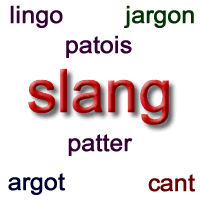Podcast: Play in new window | Download

In this episode we have a little natter about slang – what it is, where it comes from, and how it’s used.
Here are a few definitions of slang:
- language peculiar to a particular group: such as argot or jargon.
- an informal nonstandard vocabulary composed typically of coinages, arbitrarily changed words, and extravagant, forced, or facetious figures of speech.
Source: Merriam-Webster
- A kind of language occurring chiefly in casual and playful speech, made up typically of coinages and figures of speech that are deliberately used in place of standard terms for added raciness, humor, irreverence, or other effect.
- Language peculiar to a group; argot or jargon.
Source: wordnik (from The American Heritage® Dictionary of the English Language, 5th Edition)
- colloquial words and phrases which have originated in the cant or rude speech of the vagabond or unlettered classes, or, belonging in form to standard speech, have acquired or have had given them restricted, capricious, or extravagantly metaphorical meanings, and are regarded as vulgar or inelegant.
Source: wordnik (from The Century Dictionary)
- very informal usage in vocabulary and idiom that is characteristically more metaphorical, playful, elliptical, vivid, and ephemeral than ordinary language, as Hit the road.
- speech and writing characterized by the use of vulgar and socially taboo vocabulary and idiomatic expressions.
- the jargon of a particular class, profession, etc.
- the special vocabulary of thieves, vagabonds, etc.; argot.
Source: Dictionary.com
- language (words, phrases, and usages) of an informal register that members of particular in-groups favor (over the common vocabulary of a standard language) in order to establish group identity, exclude outsiders, or both.
Source: Wikipedia
The origins of the word slang are not known. It was first used in writing in 1756 to refer to the language of “low” or “disreputable” people, or the “special vocabulary of tramps or thieves”. It possibly comes from the same root as sling, from the Old Norse slyngva (to hurl) [source]
Links
Information about slang
https://www.britannica.com/topic/slang
https://www.alphadictionary.com/articles/what_is_slang.html
https://en.wikipedia.org/wiki/Back_slang
https://www.thoughtco.com/what-is-back-slang-1689156M
https://fr.wikipedia.org/wiki/Verlan
Details of specific words: natter, chat, gob (English), gob (Irish), mush, fika
Slang dictionaries
Green’s Dictionary of Slang
A Dictionary of Slang (British English)
Cockney Rhyming Slang
The Online Slang Dictionary (American, English, and Urban slang)
Music featured in this episode
The Scampering Squirrels / Y Gwiwerod sy’n Prancio
The Unexpected Badger / Y Mochyn Daear Annisgwyl
If you would like to support this podcast, you can make a donation, or contribute to Omniglot in other ways.
See the score for this tune